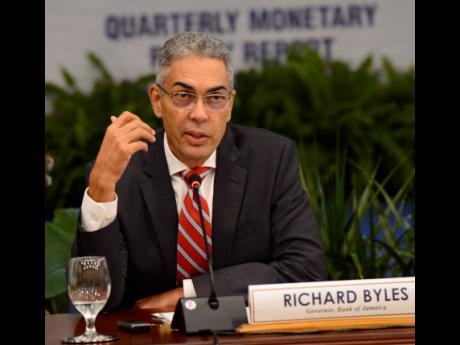BOJ transacts US$41.5m forex swap contracts in a month
J amaica’s central bank sealed over US$41.5 million ($5.8 billion) worth of currency swaps with banks and dealers, transactions that were introduced to address volatility in the foreign exchange market.
The Bank of Jamaica’s, BOJ’s, overall reading of the market is that it is largely stable, despite the 6.4 per cent dip in the value of the local currency since January.
“We wish to observe that the demand for and the supply of foreign exchange in the market is generally in balance, save and except for periodic bouts of extraordinary demand,” said BOJ Governor Richard Byles in his quarterly briefing on monetary policy at the BOJ headquarters on the Kingston waterfront.
Byles cited three factors that contributed to instances of instability: large-block demand associated with capital market or portfolio transactions; end-use demand associated with post-Christmas restocking; and authorised dealers increasing their net purchase of foreign currency in the market after net selling in December.
The Jamaican dollar traded at $141.08 on Wednesday, having depreciated by $8.48 or 6.4 per cent year to date. Wednesday’s average rate was an improvement, as the currency has traded as low as $142.58 against the USD in the period.
Byles said the introduction of the Foreign Exchange Swap Arrangement, along with the B-FXITT operations already in place, are meant to “smooth out” excess volatility and “restore orderly conditions in the market”.
The BOJ introduced the FX Swap a month ago, on January 21, to provide FX liquidity to banks and cambios at a set price. Separately, the BOJ intends to introduce its FX platform for banks and cambios later this quarter, which should improve transparency in the system.
Under the swap arrangement, the BOJ sells US dollars to dealers at an agreed ‘spot rate’, defined generally as the midday rate plus a spread based on the duration of the contract, with an agreement to buy back the same amount of US dollars at some time in the future at an agreed forward rate. That forward rate would be the spot rate at the time, adjusted for the differential between a Jamaican dollar interest rate and a US dollar interest rate.
Turning to the wider economy, the BOJ announced that it would hold its policy rates unchanged at 0.5 per cent amid targeting slightly higher inflation to spur the economy.
“Looking further ahead, the BOJ expects that the annual rate of consumer price increase will average about 4.7 per cent over the next eight quarters,” Byles said.
That period will stretch from March 2020 to December 2021.
Its target range for inflation is four-six per cent. The average rate over the past eight quarters was 3.8 per cent.
The outlook for inflation is based on the stimulating effects of the BOJ’s past monetary accommodation on prices, as well as imported inflation. Jamaica’s main trading partner, the United States, recently reported slightly higher-than-usual inflation which was blamed, in part, on that country’s deficit spending. Its annual inflation rate to January was 2.5 per cent.
Wayne Robinson, deputy governor at the BOJ, told Financial Gleaner that among Jamaica’s major trading partners, inflation inched up from 2.0 per cent to 2.2 per cent on average.

